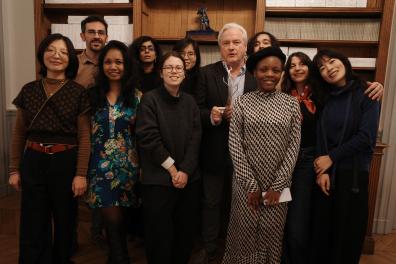Looking back and restructuring: a turning point for the LaCAS project

An award-winning project
The LaCAS platform's first phase of development has been rewarded with the Open Science in Research Data award. This is a scientific award given each year to projects committed to exemplary practices in the management, dissemination and reuse of research data. For the 2024 edition, LaCAS was awarded the "jury's special mention", in recognition of its scientific and technical rigor, the services it provides to French public research and its potential societal impact. The receipt of this award was the subject of an article on the Project Hypotheses blog, which you can consult here.
This collective success was celebrated by the project team, meeting this Wednesday, December 11, 2024 at Inalco's Maison de la Recherche:


A new stage in the making
In addition to this national recognition, the LaCAS project will acquire, in 2025, in response to a call for funding from the Île-de-France Region's SESAME program, of which it is the winner, several graphics processing units (GPUs) and storage bays, which will optimize computing and data management capacities - two major technical thrusts for the platform's future.
This acquisition will enable the deployment of the LaCAS-IA project. This aims to integrate artificial intelligence into the workflow on the LaCAS platform, notably to automate the harvesting and classification of metadata, train linguistic models on rare languages, and offer advanced processing and search tools.
A service offering undergoing restructuring
The partnerships and funding on which the project has been based since 2020 come to an end in December 2024. This situation implies a major restructuring of activities, in particular due to the departure of a substantial proportion of the team members whose employment contracts are linked to the funding obtained:
- The technical infrastructure put in place and the accompanying tools will remain functional and accessible : the data interface will continue to be fed by automated harvesting from the HAL open archive and the Nakala and Zenodo data warehouses; the editorial activity of the publications interface, although reduced and partially revised in its formats, will be continued; finally, the PEA program will also be maintained, according to a periodicity that may be subject to change.
- On the other hand, some productions will be temporarily suspended from January 2025, including the I-DEA program and the Lettre(s) de LaCAS.
In addition, the advent of the LaCAS-IA project, with the potential it offers, means that we need to rethink the way we work on the platform to process, enrich and enhance data. By automating or delegating to the machine some of the activities hitherto carried out manually, the deployment of artificial intelligence will increase the productivity of the team's work. At the same time, however, it will bring with it new skill requirements that will have to be met. For this reason, we will also need to reflect on the evolution of the project's governance at the same time.
A retrospective assessment of the work accomplished
This turning point in the deployment of the LaCAS platform is, at last, an opportune moment to reflect on the work accomplished collectively to date. A progress report tracing the evolution of the project, from its origins to the recent integration of artificial intelligence, is currently in preparation.
This document, some 50 pages long, aims to provide an overview of the project's backstage and history, its technical developments, its most recent achievements and the services it offers, as well as its governance within Inalco, the partnerships on which it relies and the team that has supported it. It will shortly be available on the Inalco website page dedicated to the LaCAS project.